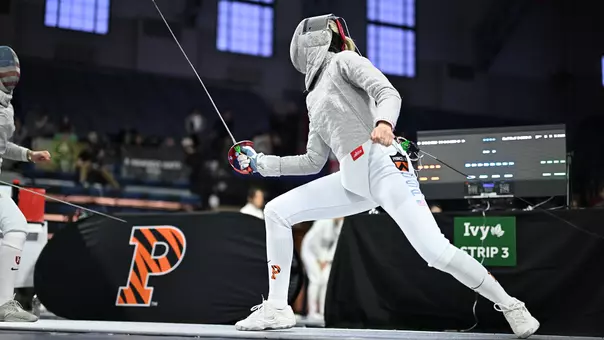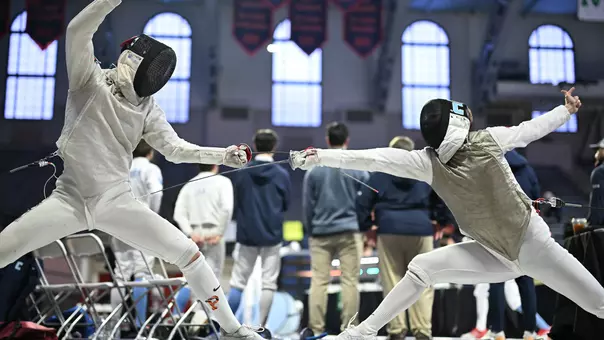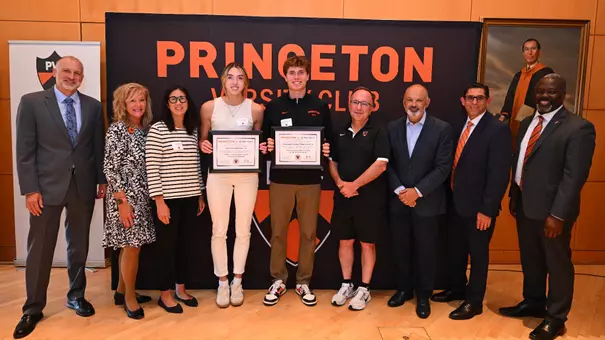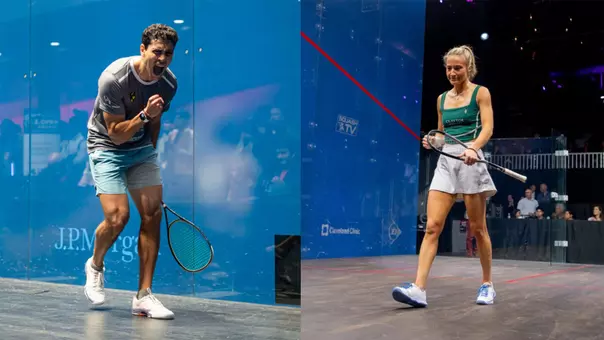Princeton University Athletics
Remembering Dave Hackett '65
January 07, 2000 | General
Jan. 7, 2000
The David S. Hackett '65 Memorial Soccer Cup is awarded each year to a member of the men's soccer team "whose enthusiasm, discipline, and leadership contributed most to the team and to the sport of soccer at Princeton." The award was established in 1968 by the classmates and teammates of Hackett, a former soccer captain and a Marine lieutenant killed in Vietnam.
Recipients of the Hackett Cup include the current coach, Jim Barlow '91, his predecessor, Bob Bradley '80, and Tom Beaton '77, now a Boston-based management consultant.
Like most recipients, Beaton knew little about Hackett when he received the cup in 1976. Now he knows a lotothanks to Ord Elliott '66, a friend of Hackett's who was by his side on the morning in April 1967 when the 23-year-old Marine died in a fierce firefight with North Vietnamese troops. When the cup is presented at the soccer banquet next winter to a member of this year's team, Beaton expects to be there to help tell Hackett's story.
He first told that story at the banquet in 1997. Although Ord, who lives near San Francisco, was unable to attend, he sent a video that was played that night in which he talked about his friendship with Hackett and described in detail what had happened in that battle 30 years before. Recalls Barlow, "It was very moving for the team," whose members vote on the recipient (that year the cowinners were seniors Ethan Bing '98 and Jamie Adams '98). iKnowing the story, the award becomes so much more meaningful."
It was an uncanny coincidence that brought Beaton and Elliott together. Elliott is also a management consultant, and he and Beaton were working with the same client in the winter of 1991. One night they wound up killing time together in the Columbus, Ohio, airport. "We were waiting to meet a third consultant who was supposed to fly in, but the weather was stormy and the airport was intermittently closed," Beaton recalls. "Ord and I didn't know each other very well, and neither of us had any idea that the other had gone to Princeton."
Elliott noticed that Beaton was reading a history of the Vietnam War, and Beaton noticed that Elliott was reading a Western novel. Elliott told Beaton something about his combat experiences and explained that the book he was reading had been a favorite of his best friend in the Marines, a fellow named Dave. He said that Dave had been talking about the book the night before he died. He explained how much Dave had admired the protagonist, an Indian named Big Lou portrayed as "strong, wily, courageous, and tenacious" - words that equally described Dave. The novel was the last in a series about Big Lou, a man whom life bends but never breaks, and Dave had read them all. "In that novel big Lou dies," said Elliott. "Somehow I think Dave knew his own time had come."
Elliott went on to tell about the last few days he spent with Dave. Their unit was near the demilitarized zone separating North and South Vietnam, at the start of a major offensive by the Army of North Vietnam. On the last night of Dave's life, he and Elliott were making the most of a quiet moment, sipping coffee and watching the twilight settle on the lush and deceptively peaceful hills surrounding them. Dave actually reflected on death - a subject Marines in combat studiously avoided - in the context of the fictional life and death of Big Lou.
"Dave was the battalion's executive officer, and the next morning at first light he went ahead with a platoon led by a green lieutenant," Elliott told Beaton. "They walked right into an ambush." Machine guns just 50 meters away pinned them down while snipers fired from the trees. Elliott's platoon closed up, and he was just a few feet from Dave when his friend stood up to locate the source of the firing and a sniper's bullet hit him in the head. Elliott was directing his own men and could only watch out of the corner of an eye as a medical corpsman tried in vain to save him. "I was angry - I was furious that this stupid war was taking my friend." Within 10 minutes Dave was dead.
Recalls Beaton of Elliott that night, "He just opened up in the way one does sometimes, under those kinds of conditions. It was two in the morning, the airport was deserted, and we found ourselves talking about these very intimate things."
When Elliott also mentioned that he and Dave had gone to college together and that Dave had been captain of the soccer team, it dawned on Beaton who he might be talking about.
"By any chance," he asked, "was your friend Dave Hackett?"
Beaton remembers that Elliott "turned and looked at me, and his jaw just dropped. I said, "You know, in 1976 I won the David Hackett Memorial Cup." Then he started crying. He didn't know there even was such an award. Then I was crying too. That night we developed an incredible bond, and we've been good friends ever since."
Elliott captained the rugby team at Princeton, and he and Hackett knew each other casually as fellow athletes. But not until January 1967, when he joined Hotel Company of the Second Battalion of the Third Marine Division in Vietnam, did their paths cross again. "Dave had been there six months and was a combat-seasoned veteran," he recalls. "He was my mentor, and he taught me things that I know saved my ass. I noticed right away the respect and trust his Marines showed toward him - his platoon was far and away the most cohesive in the company."
The Third Marines were located in I Corps, near the demilitarized zone separating North and South Vietnam, and engaged in some of the heaviest fighting of the war in the mountains around Khe Sanh. "I blocked it out for years, and in some ways itis still difficult for me to deal with," says Elliott. Of the 60 members of his platoon who went into Vietnam with him, only six remained eight months later. It was then that Elliott got a ticket home after he jumped into a bomb crater and his knees - gimpy since he first injured them playing high school football - gave out. He was shipped to a hospital in Japan, then to Bethesda Naval Hospital near Washington, and finished his tour at Marine Corps Headquarters.
"Dave was a good Marine who never questioned the war much. He was a professional soldier, and like Big Lou he accepted the rules of the game as they were," says Elliott. In fact, Hackett at the time of his death was nearing the end of his 13 months in Vietnam and had recently signed up for a second tour. Because of his knees, Elliot himself had been medically discharged from Navy ROTC in his sophomore year and had talked his way into the Marines two years later. "We have a lot of military in my family, and it was just something I wanted to do."
For Beaton, the story of Dave Hackett had a final twist.
Two months after he and Elliott discovered their mutual tie with the slain Marine, Beaton took his then three-year-old son to Phillips Academy at Andover, Mass., where Beaton had also played soccer, to meet his former coach, Frank "Deke" DiClementi. "Deke had just retired," he says. "George Bush was still president, and like me he'd been captain of the Andover soccer team. He was one of the first kids Deke had coached. I asked him who was the best he'd ever coached, as a kind of cue for him to talk to my son about Bush - and he says "Your dad!" But he did talk about Bush as one of the best.
"Then he says, 'but the best boy I ever coached was probably this one right here.' " Deke keeps pictures of all his teams and all the captains, and he took out this photo of a kid with a crewcut, with his back straight, in this old Andover uniform. And I looked at the picture and knew. I had no idea he'd gone to Andover. I said, 'This couldn't be Dave Hackett.' And he said, 'How did you know?' "
by Jim Merritt '66




